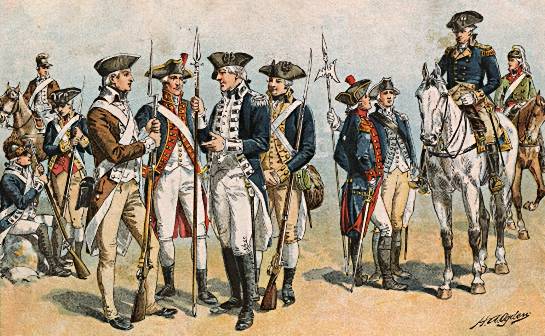
An army is a large group of soldiers, typically trained and equipped for military service. The term can also refer to the military branch of a country or state, responsible for land-based military operations. In some countries, the army is also known as the ground forces or the infantry. The army's primary role is to engage in combat with enemy forces on land, and to secure and control territory. They may also be involved in peacekeeping and humanitarian missions. The army is typically commanded by a general or other high-ranking officer, and is composed of various units such as infantry, armor, artillery, and support units.
It's essentially a nation's main ground fighting force, responsible for defending its territory and interests in land-based conflicts, often in the context of a larger war.
Here are some key characteristics of an army:
- Structure: Armies are typically divided into smaller units, such as brigades, divisions, and corps, each with its own specific roles and capabilities.
- Training: Soldiers undergo rigorous training in combat skills, tactics, and physical fitness to prepare them for the demands of warfare.
- Equipment: Armies are equipped with a wide range of weaponry and vehicles, from rifles and tanks to helicopters and drones.
- Roles: Besides combat, armies can also be involved in peacekeeping missions, humanitarian aid operations, and disaster relief efforts.
Types
- As a military branch: It refers to the land-based branch of a nation's armed forces, distinct from the navy, air force, and other branches.
- As a specific force: It can refer to a particular named army, like the United States Army or the British Army.
- More broadly: It can sometimes be used figuratively to refer to any large and organized group of people, not necessarily military in nature.
"Armies" that operate outside the military sphere:
1. Knowledge armies: These are groups of individuals with specialized knowledge and expertise, working together to tackle complex challenges. Examples include research teams, think tanks, and advocacy groups. Their "weapons" are data, analysis, and persuasive arguments.
2. Economic armies: These are large financial institutions, corporations, or even groups of consumers who wield significant economic Power. They can influence markets, shape industries, and even pressure governments through their financial clout.
3. Information armies: These are groups that leverage information and communication technologies to influence public opinion, spread awareness, or even launch cyberattacks. social media movements, online communities, and hacktivist groups fall under this category. Their "weapons" are information, virality, and digital tools.
4. Creative armies: These are groups of artists, designers, and storytellers who use their creativity to challenge norms, inspire change, and shape cultural narratives. They can use art, music, film, and even humor as their tools.
5. Service armies: These are groups of volunteers and aid workers who dedicate themselves to humanitarian efforts, providing vital services to communities in need. Their "weapons" are compassion, dedication, and practical skills.
History
The history of armies stretches back millennia, intertwined with the rise and fall of civilizations, technological advancements, and evolving concepts of warfare. Here's a glimpse into its fascinating journey:
Early Beginnings (3000 BCE - 500 BCE):
- Tribal militias: The earliest armies were likely small, temporary groups of warriors formed for defense or raids.
- Chariots and phalanxes: Civilizations like the Egyptians, Sumerians, and Assyrians developed more organized armies with chariots, archers, and heavily armored infantry formations like the phalanx.
- Bronze and iron weapons: Technological advancements in weaponry, like bronze and later iron swords, spears, and axes, influenced tactics and armor.
Classical Era (500 BCE - 500 CE):
- Rise of empires: Powerful empires like the Persians, Greeks, and Romans built vast and sophisticated armies, with innovations like siege engines and catapults.
- Legionnaires and hoplites: The Roman legion, known for its discipline and flexibility, and the Greek hoplite phalanx, with its close-packed formation, dominated battlefields.
- Professional soldiers: Some empires, like the Spartans, had professional soldier classes dedicated to warfare.
Medieval Times (500 CE - 1500 CE):
- Castles and chivalry: Feudal societies relied on heavily armored knights and mounted archers, with castles serving as defensive strongholds.
- Gunpowder's impact: Gunpowder's introduction revolutionized warfare, leading to the decline of knights and rise of firearms like muskets.
- Mercenary armies: Hired soldiers formed mercenary companies, offering their services to the highest bidder, often shaping political landscapes.
Early Modern Era (1500 CE - 1800 CE):
- Standing armies: Nations began maintaining permanent standing armies, equipped with standardized firearms and uniforms.
- Line infantry and tactics: Linear formations of musket-wielding infantry became the dominant battlefield tactic.
- Naval warfare: Naval power gained strategic importance, with countries like Britain and Spain building powerful fleets.
Industrial Revolution and Beyond (1800 CE - Present):
- Mass mobilization and technology: Industrialization enabled mass conscription and production of advanced weaponry like machine guns, artillery, and tanks.
- World wars: World Wars I and II saw unprecedented mobilization and destruction, leading to advancements in air power, chemical weapons, and armored warfare.
- Modern complexities: Today's armies are diverse, incorporating special forces, cyberwarfare capabilities, and the increasing role of technology in intelligence gathering and combat.
General:
Posted Using InLeo Alpha